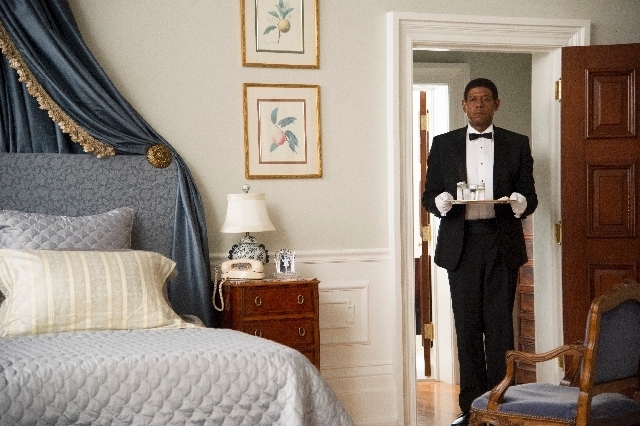The Butler needs some polish

With the arrival of “Lee Daniels’ The Butler,” the Oscar campaign season has begun in earnest.
Ultimately, that’s the one adjective that will stick with you long after you leave the theater.
Earnest.
The story of Cecil Gaines (Forest Whitaker), a White House butler spanning seven administrations from 1957 to 1986, is ever-so-loosely based on the life of the late Eugene Allen. But the result is too reverent to feel like fiction, too improbable to feel like the truth.
The civil rights movement as seen through the eyes of someone so close to power — an outsider on the inside, no less — is certainly important. But “The Butler” strives to be IMPORTANT. As a result, it has all the depth of a Wikipedia entry on the subject.
Gaines is taught to serve in 1926 as an 8-year-old brought in from the Macon, Ga., cotton fields to the main house by the plantation matriarch (Vanessa Redgrave) after his father is ruthlessly shot dead in front of him by their boss. He carries his first lesson, that a room should feel empty when he’s inside it, with him for life.
After being taken in by a father figure (Clarence Williams III) and shown the ropes at an upscale hotel, Gaines moves up to the even swankier Excelsior Hotel in Washington, D.C. It’s there that he’s noticed by a White House administrator who recommends him for an opening on the president’s staff, setting his historic career in motion.
Gaines is with Eisenhower (Robin Williams, the first of an overwhelming number of distracting casting choices) while he weighs how to handle the Little Rock school desegregation, and he brings Kennedy (James Marsden) his many, many medications. Gaines dutifully hands prune juice to a constipated LBJ (Liev Schreiber) as he conducts a meeting on the toilet, and he serves a sweaty Nixon (John Cusack) tea while he threatens to destroy the Black Panthers, whose ranks have grown to include Gaines’ estranged, militant son, Louis (David Oyelowo).
Whatever milestones Gaines doesn’t witness are experienced firsthand, often as a build-up to jail time, by Louis, the Jenny to Gaines’ Forrest Gump.
From sit-ins to his days with the Freedom Riders, Louis makes a difference on the front lines, one billy club and firehose at a time. Ashamed of his father’s status as a servant, Louis is even instructed to appreciate the proud, sometimes subversive role of the domestic by Martin Luther King Jr. (“True Blood’s” Nelsan Ellis).
As a title, “The Butler” is a bit misleading. When he arrives at the White House, Gaines is part of a six-butler staff. Two of those (a charming Cuba Gooding Jr. and a solid Lenny Kravitz) are with him for the duration.
Gaines’ wife, Gloria (Oprah Winfrey), is initially bitter because she thinks he’s more concerned about what goes on in the White House than in his own house. It’s the movie’s showiest role, as Gloria is shown drinkin’, smokin’, slappin’ and cheatin’ her way through the decades. Winfrey, though, doesn’t exactly lose herself in the character. You rarely get past that initial “Hey, look! Oprah!” jolt.
By trying to capture the entirety of the civil rights movement, screenwriter Danny Strong (HBO’s “Recount” and “Game Change”) and director Daniels (“Precious: Based on the Novel ‘Push’ by Sapphire”) often feel like they’re merely ticking off the expected boxes.
A handful of scenes — a lunch-counter sit-in juxtaposed with the gilded service at a state dinner; Gaines’ hearing about Louis’ fire-bombed bus from little Caroline Kennedy as he reads her a storybook — are clunky at best.
For a sense of what could have been, you only need to look at the burst of power “The Butler” wrings from Barack Obama’s 2008 election. Those few, brief moments offer more genuine emotion than anything that comes before it.
“The Butler” never has anything less than the best of intentions. And there are some fine performances, Whitaker’s muted dignity and Oyelowo’s fiery pride chief among them. But it would be nearly as difficult to feel transported by a textbook as it is to get swept up in what’s on-screen.
For a story of someone so refined, “The Butler” could have used some more polishing of its own.
Contact Christopher Lawrence at clawrence@ reviewjournal.com or 702-380-4567.